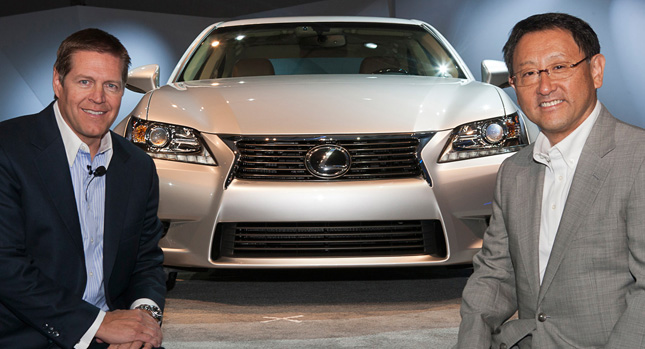Earlier this year, young people offered a job at Toyota were invited to the Japanese company’s test track. As they waited to be introduced to the firm’s race drivers, a lone Lexus LFA drove around the track, mesmerizing them with the howling screams of its V10 engine.
No one knew who the man behind the wheel was. Only after he stepped out and formally introduced himself did they learn that it was the company’s CEO, Akio Toyoda. “I asked them if they like cars”, said Toyoda. “If they didn’t, they shouldn’t bother joining.”
 When he assumed his duties in June 2009, the 55-year old grandson of Toyota’s founder said that he wanted his company to build cars that “made people happy”.
When he assumed his duties in June 2009, the 55-year old grandson of Toyota’s founder said that he wanted his company to build cars that “made people happy”.
He did not know it at the time, but it was a rather unfortunate choice of words. Less than six months later, Toyota, which up to this point had built a reputation as a manufacturer of reliable cars, had to face the unintended acceleration safety issues in the U.S. that sprouted massive and costly recalls.
Then, as the company seemed to get back on track, a massive earthquake in Japan seriously hampered production, resulting in even more losses and relegated Toyota from first place to third, behind GM and VW.
Add the strong yen, which makes manufacturing cars in Japan unprofitable, and the recent Thai floods that have once again curtailed parts supply, and you can say that Toyoda has had his share of bad luck since Toyoda took over.
However, this streak of bad luck has not made Toyoda change his mind one bit. He is not your regular CEO: one month before his appointment, he raced in the Nurburgring 24-hour endurance race in an LFA prototype under the nickname “Morizo” – and he did it again this year.
He is a self-confessed car guy and speaking to Reuters, he acknowledged that Toyota has taken quite a beating these past couple of years and may no longer be “the beast”, as rival Nissan CEO Carlos Ghosn had said, but it can certainly try to be a beauty.
Analysts agree that, apart from the financial loss, the most valuable thing Toyota has lost is its image as a maker of quality cars. “Toyota can’t get by with its quality reputation anymore. Fairly or unfairly, that’s been tarnished by the recalls”, says auto analyst Kurt Sanger of Deutsche Securities.
“But even before that, the other guys were getting better while introducing more interesting products. For Toyota to just continue to do what it was doing was not an option. It ignored that for a while.”
When Toyoda was interviewed by Larry King after the U.S. Congress investigation, the host had one last question: “What car do you drive?”
Toyoda remembers his exact thoughts: “Should I say Prius? Would that sound good? But then I decided to just let go and I felt a smile return to my face. I told him ‘I drive about 200 a year. I love cars.’”
He has no qualms about recognizing his rivals’ strengths: “I think Hyundai is making great cars, and in some ways I think we are trailing them”, he admitted in an interview. This is reflected in the two companies share prices: Hyundai’s have increased by 25% this year, while Toyota’s are down 20%.
Toyoda remains committed to turning his company around: “It’s like Steve Jobs said”, he commented referring to the late Apple founder and CEO Stanford University speech in 2005. “Stay hungry. Stay foolish. Those words really spoke to me.”
He is a hands-on guy, as well. In April, he drove the new Lexus GS 350 around the Nürburgring. He then ordered it to be re-engineered so that the production version would have a more rigid chassis, better suspension and less body roll. After sampling the 2012 Camry, he sent it back to the drawing board for major changes, especially in the interior.
If Jobs is the man who made Toyoda think hard about his attitude towards business, Hiromu Naruse, Toyota’s top test driver who was killed in an accident in an LFA outside the Nürburgring, was the person who made him get behind the steering wheel after being criticized for being ignorant about the finer points of driving.
The Lexus IS-F was a hit-and-miss first effort, very close on paper to its chief rival, the BMW M3, but never really threatening it in the real world.
The LFA was a huge improvement, although with a limited run of only 500 cars and a stratospheric price tag, it’s not really a measure of the company’s true nature.
Toyoda’s first test about building cars that “make people happy” comes in a few weeks with the unveiling of the FT-86 rear-wheel drive coupe. It will be the first real sports car bearing the Toyota name after the demise of the MR2 and the Celica.
Will it justify all the fuss about being a true, fun to drive sports car, and more importantly, will it herald a new era for Toyota, as its CEO wants? Guess we will just have to wait and see.
Story References: Reuters
PHOTO GALLERY







